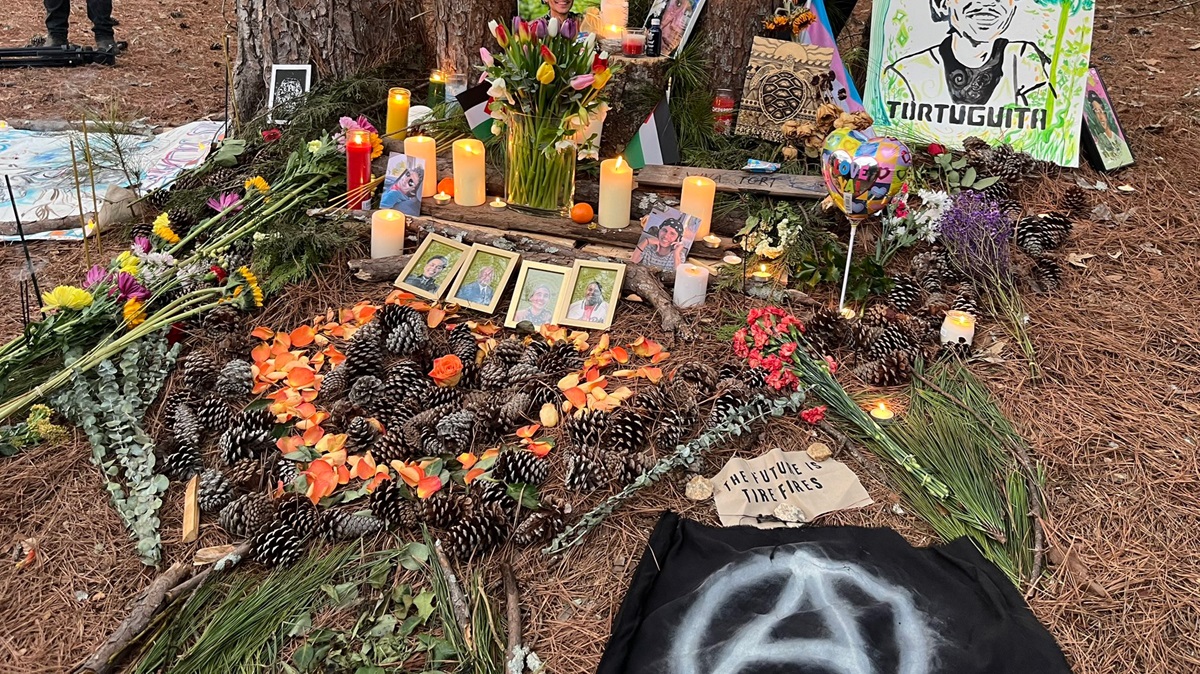Filed under: Action, Anarchist Movement, Southeast

Atlanta Community Press Collective reports on community gathering and remembrance of slain anarchist and forest defender Tortuguita.
by Nolan Huber-Rhoades
photo: @micahinATL
As the sun dipped below the Atlanta skyline on Thursday, more than 100 supporters of the Stop Cop City movement rode through the streets of East Atlanta in a solemn procession of cars and bikes, honking loudly and passionately chanting “Viva Viva Tortuguita.”
Thursday marked the one-year anniversary of the tragic death of Manuel Esteban Paez Terán, a 26-year-old queer indigenous-Venezuelan climate activist and police abolitionist known as “Tortuguita,” who was killed by Georgia State Patrol SWAT team. An independent autopsy revealed disturbing details of the incident, concluding that Troopers shot Terán at least 14 times, leaving 57 bullet wounds in their body. The autopsy also suggested that Terán was likely in a seated, cross-legged position with raised arms when killed. In February, the Atlanta Police Department released body worn camera footage from several of its officers who were close to the scene of Teran’s killing. In one of the videos, an APD officer said, “You fucked your own officer up.”
Terán holds the tragic distinction of being the first climate activist killed by police on U.S. soil.
In a somber display of unity, the convoy of cars and bikes arrived at Gresham Park to join a diverse assembly of community members for a candlelight vigil to honor the memory of the slain activist. Attendees, clutching flickering candles, shared poignant stories of Tortuguita’s impact, creating an atmosphere of reflection and solidarity. The vigil, marked by song, celebration, and quiet reverence, underscored the legacy of the activist and the community’s ongoing commitment to the cause that Terán died for.
Like many loved ones affected by police violence in the country, Terán’s family and friends await justice while they work to spread awareness of the widespread impact they had on communities and lives. The Memories of Tort web page captures some of the depth of their influence.
For over an hour, Tortuguita’s friends, family, comrades, and a former partner shared stories that memorialized the abolitionist as a multifaceted human and courageous revolutionary who committed to enjoying the life that Georgia State Troopers took from them.
Their courage, one anonymous speaker shared, was grounded by a quote from one of Terán’s favorite books, “Dune”, a 1965 science fiction novel by Frank Herbert.
“I must not fear. Fear is the mind-killer. Fear is the little-death that brings total obliteration. I will face my fear. I will permit it to pass over me and through me. And when it has gone past I will turn the inner eye to see its path. Where the fear has gone there will be nothing. Only I will remain.”
Another person, also speaking anonymously, shared that Tortuguita once helped them deal with their fear. One night during the forest occupation, the storyteller was sitting with Tortuguita around a fire while the storyteller expressed their fears about police raids, FBI infiltration, and the political repression that was sure to follow any successful attempts at stopping or delaying construction of Cop City. The storyteller recalled that, “Tort looked up and me, pointed to their temple and said, ‘Fear is the mindkiller.’”
Terán’s courage and commitment to revolutionary change were rooted in a profound love and desire for all oppressed communities to possess the power required to reshape society and enhance their material circumstances. Several vigil attendees shared that their experiences with Tortuguita involved picking them up from the forest occupation to distribute free food or defend drag queens from neo-Nazis. Belkis Terán, Tortuguita’s mother, said that they once asked her to teach them how to cook so they could make food for a group of elders in their community while living in Panamá.
Terán supported the workers unionizing through the Industrial Workers of the World (IWW). While they attended undergraduate school at Florida State University in Tallahassee, Florida, Terán helped found Live Oak Radical Ecology where they studied plants and grew food to distribute freely to members of the community. One vigil attendee who met Tortuguita while they were living in the Atlanta forest shared, “[Tortuguita was] a badass who made the woods a more habitable space for people of color,” adding, “they were a very kind person to me when I really needed it.”
Attendees who knew Terán reminded the crowd that while Tortuguita was committed to revolutionary organizing, they were almost as intense about taking time to rest and have fun. Several attendees told stories about Tortuguita offering to share their weed upon meeting someone for the first time. Belkis Terán was met with laughter when she said, “Manuel had many lovers. Yes. Many many lovers.” Later, a former partner of Tortuguita recalled that the abolitionist would often spend time away from other forest defenders to relax in a hammock and post memes on the internet.
The collection of stories shared throughout the night remembered Tortuguita as a courageous revolutionary, lover, brilliant thinker, mischievous force for justice, someone who refused to shy away from conflict or debate over important ideas, and a stoner who knew exactly which herbs or fungi to offer when it was time deescalate conflict or get to know someone new.
“The struggles against Cop City and other projects of death persist,” said one of the vigil organizers. “Yesterday’s gathering served as a poignant moment of remembrance for the martyrs. In mourning the departed, we fiercely advocate for the living.”





